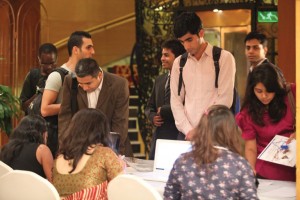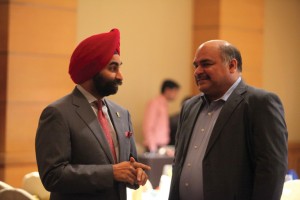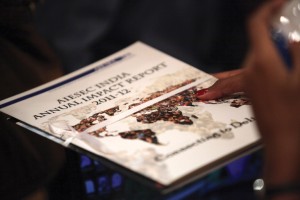On May 4, 2012, the AIESEC India National Stakeholders’ Summit took place in Mumbai to celebrate the organisation’s growth and contribution to society and for activating leadership amongst the youth and aiding the creation of leaders across the world. The year 2012 also marks 31 years since AIESEC began its journey in India. Today, they have 18 chapters with over 5000 members. Present were over 200 attendees that included CEOs, directors and chairmen of top business houses as well as the AIESEC National Board of Advisors, the AIESEC India National team and presidents of the local chapters of AIESEC India.
Notable among the invitees was Shivinder Singh, managing director of Fortis Healthcare, Ronnie Screwvala, CEO of UTV and financial whiz Deepak Parekh, chairman of HDFC Bank. The summit was opened by Sahil Dewan, president, AIESEC India who rightly pointed out that half a billion of India’s population comprises the youth, with around 50 per cent of them below the age of 25 years. This certainly speaks of the amazing potential that India has to offer. The keynote speakers at the summit had interesting things and valuable insights to share with the audience.
Shivinder Singh started off on a realistic note, saying that the opportunities for the youth in India are countless. While this is an encouraging situation, it is challenging as well. He highlighted the attributes that a leader should possess such as vision, the ability to inspire, the need to have a strong value system and to lead others by actually taking an initiative.
 He went on to raise his concern about India being a morally challenged country, adding that if we must develop as a nation, we need to don the suits that are woven with moral fabrics. The second challenge, he felt, is the underutilisation of the educated youth. He believes that our country needs people who have a strong sense of self belief and who can take the path less trodden, overcoming the challenges they might face along the way. Offering inspiration to the audience, he said that many successful Indians are those who started organisations on their own and who embodied entrepreneurial qualities. He said that the mantra of jugaad is essentially what makes us entrepreneurs; the Chinese can copy and produce the exact same thing, whereas an Indian will always improvise and think of how he could do it better. He concluded his keynote by sharing that the best thing about AIESEC is that it is fully voluntary, where people don’t get paid for their work, but learn a lot that helps them build their personality and leadership qualities as well.
He went on to raise his concern about India being a morally challenged country, adding that if we must develop as a nation, we need to don the suits that are woven with moral fabrics. The second challenge, he felt, is the underutilisation of the educated youth. He believes that our country needs people who have a strong sense of self belief and who can take the path less trodden, overcoming the challenges they might face along the way. Offering inspiration to the audience, he said that many successful Indians are those who started organisations on their own and who embodied entrepreneurial qualities. He said that the mantra of jugaad is essentially what makes us entrepreneurs; the Chinese can copy and produce the exact same thing, whereas an Indian will always improvise and think of how he could do it better. He concluded his keynote by sharing that the best thing about AIESEC is that it is fully voluntary, where people don’t get paid for their work, but learn a lot that helps them build their personality and leadership qualities as well.
Ambassador Neelam Deo, the Former Consul General of India in New York, spoke about the importance of the creation of brand India in the local market place. Interestingly, she asked the audience what product would India be if it so happened to be a product. She compared it to an iPad, saying that the country, just like the now ubiquitous and multifaceted gadget, is an aggregation of various things. She elaborated on this, saying that India is an aggregation of ideas and aspires to be a secular, democratic country regardless of gender, caste and religion with so many multi-hued features. She also asked who the people who market India are; to which she said that it was the young people themselves. For instance, she said, AIESEC has been successfully marketing India and hundreds of its institutes abroad.
 Yogesh Thakur, resource manager at Tata Consultancy Services, shared his experiences with AIESEC saying that the energy, capability, possibilities and leadership provided are the lessons that are taught here. He also spoke about the programme called ‘ACE’ that was started in 2004, adding that it has reached a point that it can offer experiential leadership and learning to interns all over the world. He stressed on the fact that the experience remains long after the internship period has ended. For instance, this very programme has resulted in a number of different development projects for people from various countries and fields. The audience was enthralled with the funny stories and moments that he had experienced during his AIESEC tenure.
Yogesh Thakur, resource manager at Tata Consultancy Services, shared his experiences with AIESEC saying that the energy, capability, possibilities and leadership provided are the lessons that are taught here. He also spoke about the programme called ‘ACE’ that was started in 2004, adding that it has reached a point that it can offer experiential leadership and learning to interns all over the world. He stressed on the fact that the experience remains long after the internship period has ended. For instance, this very programme has resulted in a number of different development projects for people from various countries and fields. The audience was enthralled with the funny stories and moments that he had experienced during his AIESEC tenure.
Next up was Anirban Das Blah, managing director, KWAN, the largest entertainment, fashion, celebrity and sports management company in India. He shared his experiences of growing up in Shillong with a middle-class background and not having the chance to study business. For him, AIESEC was like a school of thought. He retraced his journey from being a popular guy to being labelled a loser within a span just 90 days in AIESEC, emphasising the fact that it is an organisation where one is surrounded by people and has to prove that they have the right of leadership and even win respect instead of trying to be popular. He felt that some of the biggest challenges in his life were faced while he was in AIESEC. One of the most important lessons in entrepreneurship that he learnt here was the need to get used to people asking questions. In conclusion, he said that an entrepreneur needs to build a platform without worrying about the salary, underinvestment or lack of resources. He offered his suggestions on a few things that an entrepreneur should keep in mind: Entrepreneurs are positive people and they should not complain; they should focus on people and build an emphatic approach in doing business; and lastly, they should give back to the society in some way. Ramita Vig, the young and dynamic newly elected President of AIESEC India concluded by saying that AIESEC India aims to become the pioneering youth organisation in India by 2015. She expressed her wishes that every young Indian citizen should experience the power of AIESEC.
At the end of the talks, there was a global exhibition by international AIESEC students who are currently interning in Mumbai. The students displayed stalls of their respective countries, such as Russia, Bolivia, Brazil and Ghana and so on. Dressed in their national costumes and showcasing some local cuisine, they spoke about the advantages and business possibilities in their countries. It was a chance to meet and understand the youth in these upcoming countries up close and personal.
Volume 1 Issue 12



























